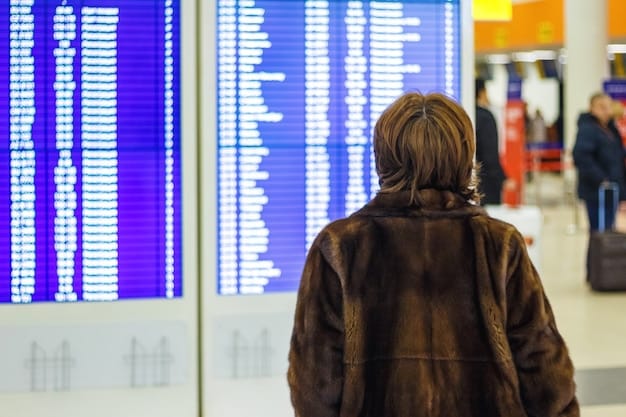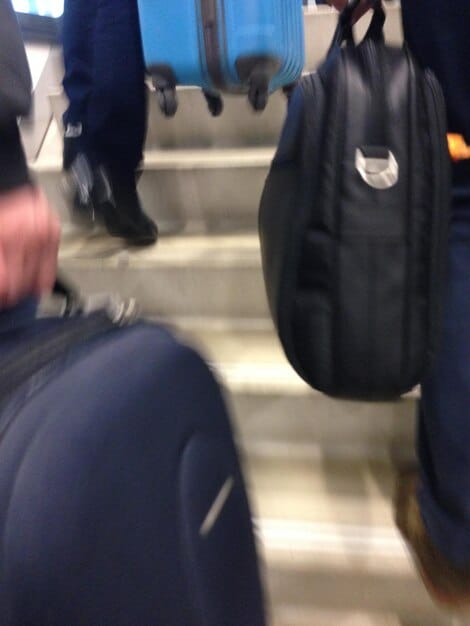Decoding Airline Baggage Fees in 2025: A US Flyer’s Guide

Decoding Airline Baggage Fees in 2025: A Comprehensive Guide for US Flyers unravels the complexities of airline baggage fees, offering strategies to avoid unexpected costs, understand airline policies, and navigate travel in the United States with savvy planning and updated information for the year 2025.
Navigating airline baggage fees can feel like deciphering a secret code. In 2025, with evolving airline policies, it’s more important than ever for US flyers to understand these costs. This guide, Decoding Airline Baggage Fees in 2025: A Comprehensive Guide for US Flyers, equips you with the knowledge to travel smarter and avoid unexpected expenses.
Understanding the Basics of Airline Baggage Fees
Airline baggage fees are charges levied by airlines for checking luggage, in addition to the base fare of your ticket. These fees can vary significantly depending on the airline, the route, the class of service, and your frequent flyer status. Understanding these variables is the first step in mastering the art of avoiding them.
Before diving into specifics, it’s crucial to recognize that airline baggage fee policies are not standardized. Each airline sets its own rules, weight and size limits, and fee structures. Failure to comply with these policies can result in hefty charges, sometimes exceeding the cost of your ticket.
Why Do Airlines Charge Baggage Fees?
Airlines introduced baggage fees as a revenue-generating strategy, especially in response to rising fuel costs and increased competition. By unbundling services, airlines offer lower base fares while charging extra for amenities like checked baggage, seat selection, and meals. While this can benefit travelers who pack light, it requires careful planning to avoid extra costs.
Types of Baggage Fees
- Checked Baggage Fees: These are the most common fees, charged for each bag you check into the cargo hold.
- Oversized Baggage Fees: If your bag exceeds the airline’s size limits, you’ll likely incur an additional fee.
- Overweight Baggage Fees: Similarly, if your bag weighs more than the allowed limit, you’ll be charged an overweight fee.
- Special Item Fees: Some airlines charge extra for specific items like sports equipment, musical instruments, or fragile goods.

To avoid these fees, always check the specific baggage policies of the airline you’re flying with. Airlines’ websites provide detailed information on size and weight restrictions, as well as fee schedules. Pay close attention to these details when booking your flight.
Strategies to Avoid Baggage Fees
Avoiding baggage fees is an art form that combines smart packing, strategic booking, and leveraging airline loyalty programs. With a bit of planning, you can significantly reduce your travel expenses and breeze through the airport without the worry of extra charges.
One of the most effective strategies is to pack light. Consider whether you really need everything you plan to bring. Can you mix and match outfits? Can you do laundry at your destination? Reducing the number of items you pack can make a big difference.
Packing Light: Tips and Tricks
Packing light doesn’t mean sacrificing comfort or style. It’s about being strategic and making the most of what you bring. Rolling your clothes instead of folding them can save space, and using packing cubes can compress your items and keep your suitcase organized.
Another useful tip is to wear your heaviest items on the plane. Bulky sweaters, jackets, and boots take up a lot of space in your suitcase, so wearing them can free up valuable room. Additionally, consider purchasing travel-sized toiletries or buying them at your destination to save weight and space.
Leveraging Credit Cards and Loyalty Programs
Many airline credit cards offer benefits like free checked bags, priority boarding, and lounge access. If you frequently fly with a particular airline, consider signing up for their credit card. The annual fee might be worth it if you regularly check bags.
- Airline Credit Cards: Many offer a free checked bag for you and sometimes even travel companions.
- Airline Loyalty Programs: Frequent flyers often earn status that includes free checked bags.
- General Travel Rewards Cards: Some cards offer statement credits for travel purchases, effectively offsetting baggage fees.
Shipping Your Luggage
If you’re traveling with a lot of luggage or bulky items, consider shipping your belongings to your destination. Services like UPS, FedEx, and specialized luggage shipping companies can often be more cost-effective than paying airline baggage fees, especially for oversized or overweight items. Just make sure to account for shipping time and potential delays.

By employing these strategies, you can significantly reduce or even eliminate baggage fees on your next trip. Smart packing, strategic booking, and leveraging loyalty programs are your allies in the battle against extra travel expenses.
Understanding Airline-Specific Baggage Policies
Each airline has its own set of rules and fees regarding baggage. Understanding these specifics can help you make informed decisions when choosing an airline and packing for your trip. Let’s delve into the policies of some major US airlines.
Airlines like Delta, United, and American have different fee structures and weight/size limits. It’s essential to visit each airline’s website and review their baggage policies before booking your flight. Failure to do so could result in unexpected charges at the airport.
Delta Air Lines
Delta Air Lines charges a fee for the first checked bag on most domestic routes, with higher fees for additional bags or overweight/oversized items. However, certain fare classes and SkyMiles Medallion members may be eligible for free checked bags. Delta also provides a baggage fee calculator on their website to help you estimate costs.
United Airlines
United Airlines has a similar baggage fee structure, with fees for the first and second checked bags on most domestic flights. Premier members and those traveling in premium cabins often receive complimentary checked baggage. United also offers a pre-purchase option for baggage fees, which can sometimes be cheaper than paying at the airport.
American Airlines
American Airlines also charges for checked baggage on many domestic routes, with fees increasing for each additional bag and for overweight/oversized items. AAdvantage elite members and those traveling in first or business class are typically entitled to free checked bags. American provides detailed baggage information on their website, including a tool to calculate potential fees.
- Always check the airline’s official website for the most up-to-date information.
- Consider purchasing baggage allowance in advance, as it’s often cheaper.
- Be aware of weight and size limits to avoid overweight/oversized fees.
Staying informed about airline-specific baggage policies is crucial for avoiding unexpected costs. Always verify the details before your flight and pack accordingly.
The Impact of Fare Classes on Baggage Fees
The fare class you choose when booking your flight can significantly impact your baggage fee situation. Different fare classes come with varying levels of included amenities, including baggage allowance. Understanding these differences can help you make cost-effective choices.
Basic Economy, Main Cabin, Premium Economy, Business Class, and First Class each offer different levels of included baggage allowance. Basic Economy often has the strictest rules, with no free checked bags, while premium classes typically include one or more free checked bags.
Basic Economy
Basic Economy fares are designed to be the most budget-friendly option, but they often come with significant restrictions, including no free checked bags. If you’re flying Basic Economy and need to check a bag, you’ll likely have to pay extra. These fares also often have restrictions on seat selection and boarding priority.
Main Cabin
Main Cabin fares usually include more flexibility than Basic Economy, but they still often require you to pay for checked bags. However, some airlines offer free checked bags to certain Main Cabin passengers, depending on their frequent flyer status or credit card benefits.
Premium Economy, Business Class, and First Class
Premium Economy, Business Class, and First Class fares typically include one or more free checked bags, along with other perks like priority boarding, extra legroom, and complimentary meals. While these fares are more expensive, the included amenities can make them a worthwhile investment for some travelers.
When booking your flight, carefully consider the fare class and its included baggage allowance. Factor in the cost of potential baggage fees when comparing different options to make the most economical choice.
Future Trends in Airline Baggage Fees (2025 and Beyond)
As airlines continue to adapt to changing market conditions and consumer preferences, baggage fees are likely to evolve. Staying informed about these trends can help you anticipate future costs and plan your travels accordingly. What can US flyers expect in 2025 and beyond?
Some experts predict that airlines will continue to unbundle services, offering even lower base fares while charging more for extras like checked baggage, seat selection, and in-flight entertainment. This could lead to more complex and personalized pricing structures.
Dynamic Pricing
Airlines may implement dynamic pricing for baggage fees, adjusting prices based on factors like demand, time of year, and route. This means that baggage fees could fluctuate significantly, making it more challenging to predict costs. Travelers will need to be vigilant and compare prices across different airlines and booking platforms.
Technology Integration
Technology could play a greater role in baggage management, with airlines using tools like mobile apps, RFID tags, and AI-powered systems to track and manage luggage more efficiently. This could lead to smoother baggage handling and reduced instances of lost or delayed luggage.
- Expect more personalized and dynamic pricing for baggage fees.
- Keep an eye on technological advancements that could impact baggage handling.
- Stay informed about airline policies and adapt your travel strategies accordingly.
The future of airline baggage fees is uncertain, but by staying informed and adaptable, you can continue to travel smart and avoid unexpected costs.
Advocating for Fair Baggage Fee Policies
As consumers, we have the power to influence airline policies and advocate for fairer baggage fee practices. By voicing our concerns and supporting initiatives that promote transparency and consumer rights, we can help shape the future of air travel.
Consumer advocacy groups and travel organizations often lobby airlines and government agencies to address issues like hidden fees, lack of transparency, and unfair practices. Supporting these groups can help amplify your voice and effect positive change.
Contacting Airlines Directly
If you have a negative experience with airline baggage fees, consider contacting the airline directly to voice your concerns. Many airlines have customer service departments that handle complaints and feedback. While individual complaints may not always result in immediate change, they can contribute to a broader understanding of consumer sentiment.
Supporting Consumer Advocacy Groups
Consumer advocacy groups work to protect the rights of travelers and promote fair practices in the airline industry. These groups often conduct research, publish reports, and lobby for legislative changes. Supporting their efforts can help create a more equitable and transparent travel environment.
By taking action and advocating for fair baggage fee policies, you can contribute to a better travel experience for yourself and others. Your voice matters, so don’t hesitate to speak up and make a difference.
| Key Point | Brief Description |
|---|---|
| 💰 Avoid Fees | Pack light, use loyalty programs, or ship luggage. |
| ✈️ Airline Policies | Each airline has specific rules for baggage fees. |
| 🎫 Fare Class | Different fare classes offer varying baggage allowances. |
| 🌐 Future Trends | Expect dynamic pricing and tech integration. |
Frequently Asked Questions (FAQ)
▼
Most US airlines have a weight limit of 50 pounds (23 kg) and linear dimensions (length + width + height) of 62 inches (157 cm) for checked baggage. Exceeding these limits usually results in additional fees.
▼
Visit the airline’s official website and search for their baggage policy or checked baggage information. This section typically outlines all fees, size limits, and other relevant information.
▼
Typically, you can bring one personal item (like a purse, laptop bag, or small backpack) and one carry-on bag for free. However, check with your airline for specific size and weight restrictions.
▼
Baggage fees usually apply per direction, so if you have connecting flights on the same airline, you generally only pay once. However, if you switch airlines, you may have to pay the fee again.
▼
If your baggage is lost or delayed, you can file a claim with the airline for compensation. Airlines typically reimburse reasonable expenses incurred due to the delay, so keep your receipts.
Conclusion
Understanding and navigating airline baggage fees in 2025 requires staying informed, packing strategically, and advocating for fair policies. By implementing the tips and strategies outlined in this guide, US flyers can travel smarter, avoid unexpected costs, and enjoy a smoother journey, ensuring that the focus remains on the destination rather than the expenses along the way.





